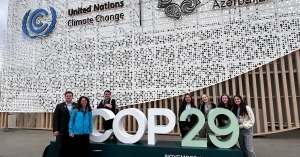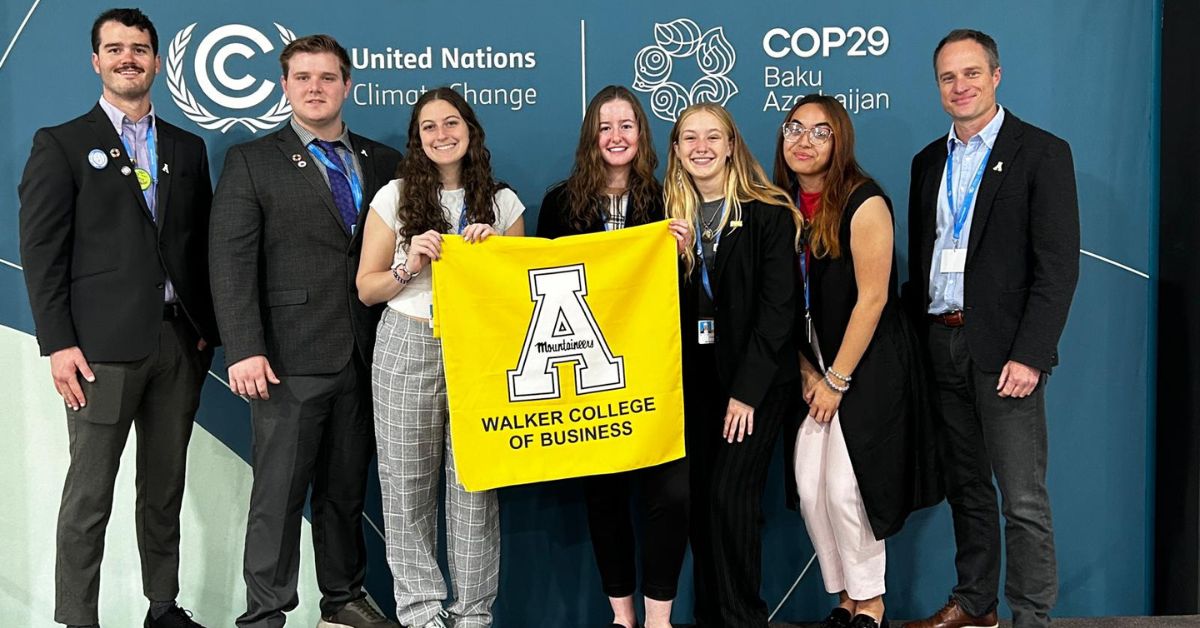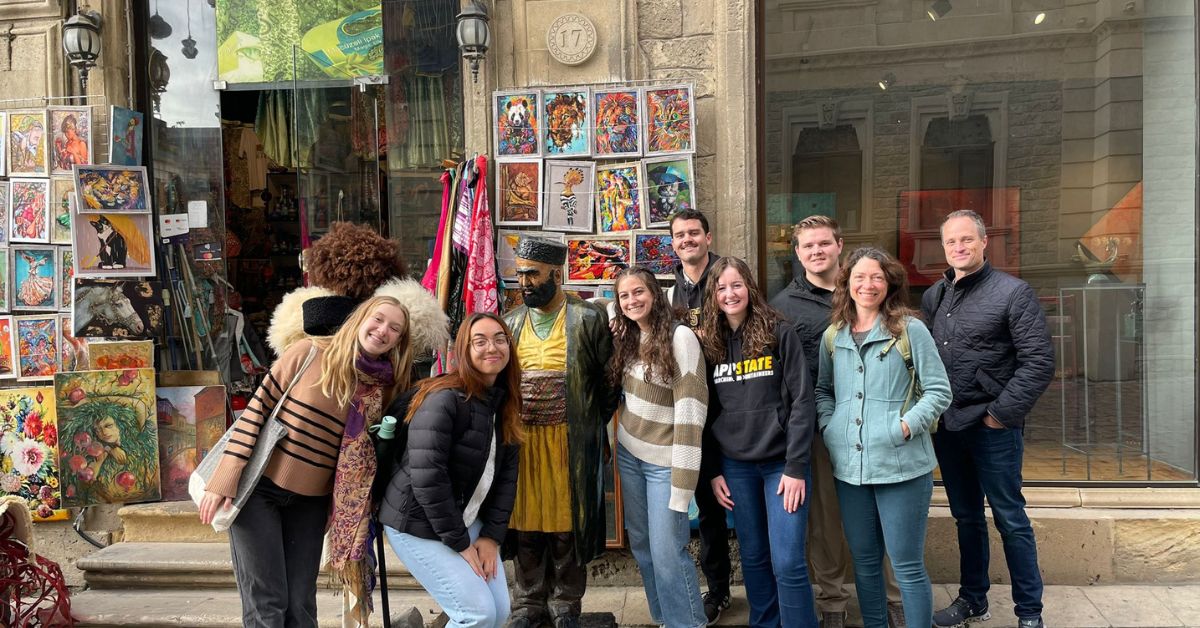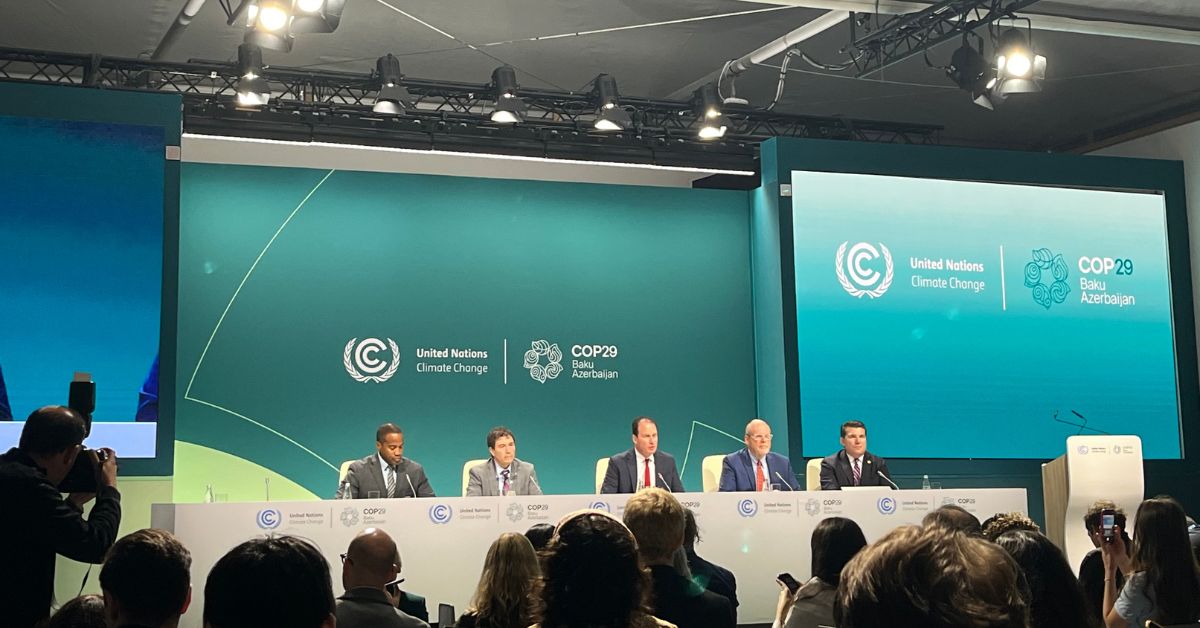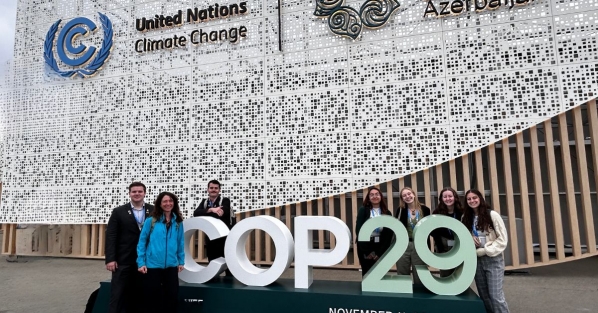A student delegation from Appalachian State University had a front-row seat to high-stakes negotiations and international diplomacy at the UN Climate Change Conference of the Parties (COP).
It was the fourth consecutive year App State had officially participated. App State is included among the Research and Independent Non-Governmental Organizations (RINGO), one of nine NGO constituencies recognized by the convention.
COP 29, organized by the United Nations Framework on Climate Change, took place November 2024 in Baku, Azerbaijan. It gathered 60,000 participants from about 200 nations to discuss and negotiate global climate action.
Related: 6 App State students observe world climate policymaking at UN climate conference (COP 27)
Key outcomes of COP 29 included tripling climate finance contributions from UN member states for developing countries, establishing a global emissions trading system starting in 2025, and setting more ambitious emissions reduction targets for methane and other pollutants. Some countries also announced stricter emissions targets.
Dr. Dave McEvoy, chair of App State’s Department of Economics, secured observer status for the university in 2020 through a rigorous process, aiming to inspire students to engage with high-level climate action.
“App State’s UN Climate Negotiations program offers students a unique opportunity to participate in the global effort to address climate change,” said McEvoy. “As delegates, students get to observe first-hand how challenging it is to balance the perspectives and objectives of roughly 200 countries toward a common goal.”
Related: Walker College faculty attend COP26, lay groundwork for global connections for students
McEvoy leads the student delegation and teaches a semester-long course on UN Climate Negotiations in preparation for the unique experience.
2024 Student Delegates
The 2024 student delegation included representation from a variety of academic disciplines at both the undergraduate and graduate levels.
Alex Griffa is a finance and banking major. Grace Knapp is a global studies major. Kennedi Ratcliffe is double majoring in economics and political science, and Nicole Tran is a political science major.
Three graduate students participated. Xander Brown is earning a master’s degree in Applied Data Analytics and Political Science, Nick Roberto is earning an MBA, and Sarah Widderich is earning a master’s in Political Science.
View student bios on the UN Climate Negotiations program page.
COP 29 Student Takeaways
Students were tasked with creating policy briefs on their primary issues of interest, including nuclear energy policy, carbon credit trading, and impacts on indigenous communities. They shared some of their insights.
Roberto spoke with a delegate from Kazakhstan, who shared concerns about the severe desertification of their land, which is driven by neighboring countries' use of the Volga River.
"A key takeaway for me was the need for international cooperation in climate action with cross-border implications,” said Roberto. “It was also thrilling to see additional signatories adopt the Declaration to Triple Nuclear Energy and see that discussions are being held across the climate action spectrum."
Knapp focused on how climate disasters and policymaking impact Indigenous populations, especially in Small Island Developing States (SIDS).
“These communities face unique challenges due to their size, location, and limited access to technology,” said Knapp. “A just transition to renewable energy must take into account the needs of marginalized communities and [their] self-determination, including funding challenges.”
At COP 29, students also hosted an exhibit with Vanderbilt University on climate education innovations, including Appalachian State’s Quality Enhancement Plan (QEP) and took time to explore the region.
Cultural Experiences in Azerbaijan
The conference location in Baku, a city with a rich history and significant fossil fuel exports, highlighted the complexities of global climate response. Students explored Baku’s ancient walled city and modern boulevards and took an excursion to see nearby Gobustan's paleolithic rock carvings and mud volcanoes, gaining a deeper understanding of the region's cultural and environmental context.
Meredith Church Pipes, global and civic engagement specialist for the Walker College of Business and program co-leader, helped coordinate meaningful cultural discussions in class and activities on-site in Baku.
“Geographical context is an important aspect of this experience for students,” said Pipes. “Successful diplomacy and global-scale problem-solving will only be possible if there is a respect for the cultures and contexts of the parties involved."
Pipes said this guided the App State approach to the students' pre-travel preparations, which included exploring Azerbaijan’s unique history, and informed the itinerary while at the conference.
Global Climate Leadership Development at App State
Dr. Martin Meznar, associate dean for global and civic engagement, said an emphasis on a global mindset and dedication to sustainability sets apart App State and the Walker College from other schools.
“Students gain firsthand knowledge of the complicated process of dealing with a thorny problem that affects the entire globe,” said Meznar. “App State is part of a select group of research institutions with a seat at the discussion table.”
This year’s student delegation recognized the value of this experience and shared its impacts.
“Attending COP 29 was one of the most impactful experiences of my life, deepening my understanding of international climate policy and the importance of global collaboration,” said Ratcliffe. “I will carry this experience with me far beyond my college career.”
Knapp echoed this sentiment.
“I am extremely grateful for this opportunity. Not only did I gain knowledge regarding how climate change and human rights go hand in hand, but I also immersed myself in a new and unique culture,” said Knapp. “I will continue to share this knowledge and implement it throughout my professional career.”
View photos from this year’s program and follow student posts on the program's Instagram account, appstatetocop.
Related: Find your Sustain Ability Podcast (December 2024) features Grace Knapp and Nicole Tran.
Student travel to the UN Conference is funded in large part by the Walker College of Business through the generosity of donors who believe in the importance of experiential learning for students. If you want to support international experiences like this, please contact Kyle Allen, allenkb2@appstate.edu, (828) 262-6231.
Participate in App State's UN Climate Negotiations program
Students are selected for App State's UN Climate Negotiations program through a competitive process. Students who are interested in participating should contact Dr. Dave McEvoy, mcevoydm@appstate.edu. Applications for the fall 2025 cohort with travel to COP 30 in Belen, Brazil will open in April 2025. Find more information online, https://economics.appstate.edu/cop.
About Sustainable Business at Appalachian
Appalachian’s Walker College of Business is committed to advancing sustainable business practices that promote responsible management of economic, social and natural resources. The theory and practice of sustainable business recognizes that the economy, environment and society (the triple bottom line) are interconnected and interdependent, and strives to enhance the business model so that it can flourish and thrive to benefit future generations. The college offers a sustainable business minor available to business and nonbusiness majors, a bachelor’s degree in environmental economics and policy, and an MBA concentration in sustainable business. The programs focus on student engagement, research and community involvement. For more information, visit https://business.appstate.edu/sustain.
